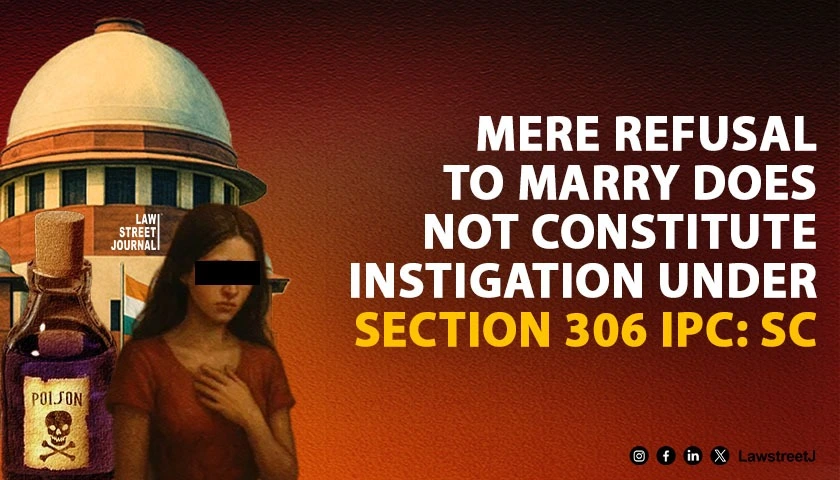New Delhi: The Supreme Court of India has delivered a significant judgment clarifying the scope of abetment of suicide under Section 306 of the Indian Penal Code, ruling that a mere refusal to marry, even if it causes emotional distress, does not amount to instigation for suicide.
A Bench of Justice J.B. Pardiwala and Justice K.V. Viswanathan was hearing an appeal challenging an order passed by the High Court of Punjab and Haryana, which had dismissed the appellant’s petition under Section 482 Cr.P.C. seeking quashing of the FIR.
The case involved an incident where a young government advocate died by suicide after the appellant declined to marry her due to family opposition. The Court noted, “It appears from the materials on record that the appellant and the deceased had intimacy for each other and were desirous of getting married, particularly the deceased. It also appears from the evidence that there was significant opposition from the appellant’s family.”
Addressing the circumstances, the Court observed, “As the appellant was reluctant to get married to the deceased, she took the extreme step of consuming poison at her own house and ultimately succumbed.”
The Court clarified the distinction between emotional distress and legal abetment: “On one hand, the appellant wanted to marry the deceased as it appears he had love and affinity for her, whereas on the other, he was helpless before his parents.”
Discussing the ingredients of Section 306 IPC, the Court stated, “The ingredients to constitute an offence under Section 306 IPC would stand fulfilled if the suicide is committed due to direct and alarming encouragement or incitement by the accused, leaving no option but to commit suicide. The act of instigation must be with the intention to push the deceased into such a situation that she is left with no other option.”
Referencing the Supreme Court ruling in Nipun Aneja & Others vs. State of Uttar Pradesh, the Bench reiterated that “without a positive act on the part of the accused to instigate or aid in committing suicide, conviction cannot be sustained.” It emphasized that “clear mens rea is required to convict under Section 306 IPC.”
Regarding the appellant’s conduct, the Court observed, “Even if we believe that the appellant, due to opposition from his family, declined to marry the deceased, it cannot be said he led to a situation where the deceased was left with no other option but to commit suicide.”
On the emotional aspect, the Court noted, “It is very sad that a young girl took the extreme step. It is possible she might have felt hurt. One sensitive moment took away a young life. However, as judges, we must decide based on the evidence.”
The Court held: “Mere refusal to marry, even if true, would not amount to instigation under Section 107 IPC.”
It further observed that continuing the trial would be a “travesty of justice,” and noted that the informant (mother of the deceased) had chosen not to appear before the Court despite being served notice.
In conclusion, the Court held that no ingredients of abetment under Section 306 IPC were made out, quashed FIR No. 273 of 2016 dated 07.11.2016, and consequently quashed Sessions Case No. 728 of 2018 pending before the Court of the Additional Sessions Judge, Amritsar.
Mr. P.S. Patwalia, Senior Advocate, appeared for the appellant. Mr. Mohit Siwach appeared for the State.
Case Title: Yadwinder Singh @ Sunny vs. State of Punjab & Anr.













